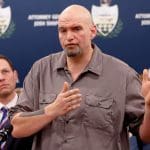The 2023 March on Washington: ‘Continuing the Dream’
‘We can’t get free unless we control our own bodies, our lives, and our futures,’ said Alexis McGill Johnson, president of Planned Parenthood.
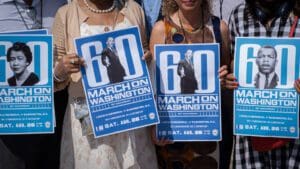
WASHINGTON — The 1963 March on Washington for Jobs and Freedom was one of the most important demonstrations for human rights in U.S. history.
On Aug. 28, 1963, some 250,000 people gathered at the steps of the Lincoln Memorial in Washington, D.C., to demonstrate against the systemic inequities faced by Black Americans. It was the spot where Dr. Martin Luther King Jr. delivered his “I Have a Dream” speech.
Sixty years later, on a sweltering Saturday, Aug. 26, tens of thousands convened on the National Mall to mark the anniversary of the iconic march and continue the conversation about fighting for social justice and civil rights.
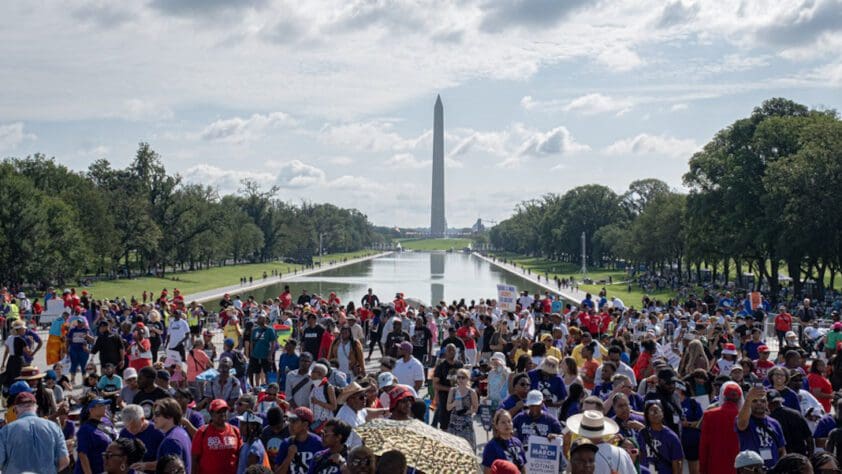
This year’s march was organized by Martin Luther King III; activist Arndrea Waters King, president of the social justice organization the Drum Major Institute, who is married to Martin Luther King III; their daughter, Yolanda Renee King, Martin Luther King Jr.’s only grandchild; the Rev. Al Sharpton, founder and president of the National Action Network; and by over 100 partner organizations.
The march highlighted the issues faced by marginalized groups today: the restrictions on abortion put in place in the aftermath of the decision of the U.S. Supreme Court that overturned Roe v. Wade in June 2022; the court’s decision declaring affirmative action in college admissions unconstitutional, voter suppression; gun violence;, and ongoing racist violence and threats of violence against Jewish, Black, brown, Asian, and LGBTQ+ Americans.
Monica Tempro-Sayers, a volunteer at the march, shared with the American Independent Foundation that her now-94-year-old father had marched with King in 1963.“I’m here to represent him,” she said.
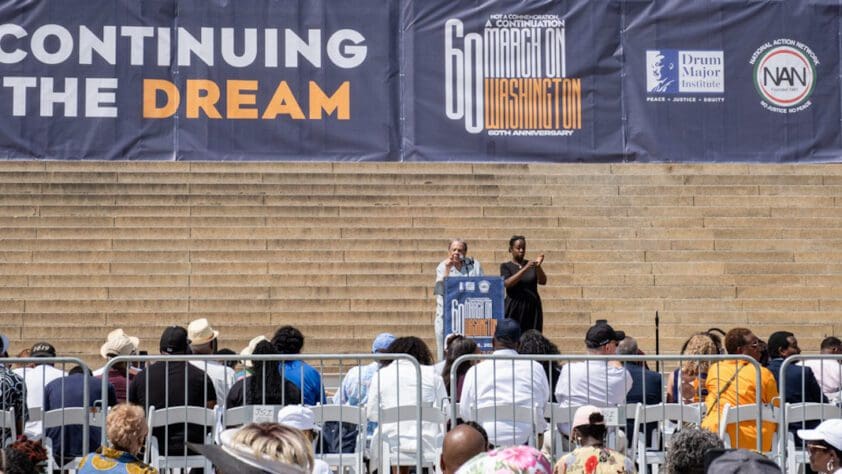
The list of speakers at the five-hour program at the Lincoln Memorial, before the marchers began a half-mile walk to the Martin Luther King Jr. Memorial, included many high-profile names: members of the King family, Sharpton, civil rights leader and former politician Andrew Young, Rep. James Clyburn (D-SC), Rep. Hakeem Jeffries (D-NY), anti-gun violence activist David Hogg, and actor and comedian Sasha Baron Cohen.
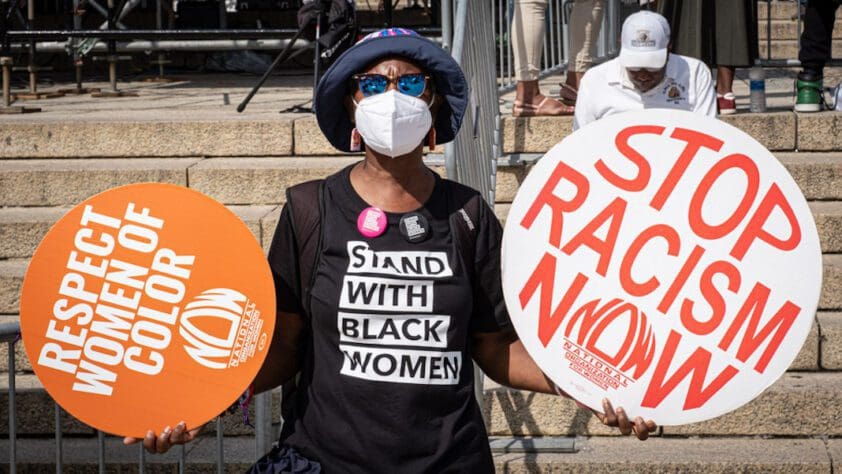
Ebony Baylor, the vice president of government affairs at In Our Own Voice: National Black Women’s Reproductive Justice Agenda, told the American Independent Foundation that her organization was involved in this year’s march “first and foremost, to call out inequities when it comes to reproductive rights, but also to educate people about the intersections of reproductive justice, the importance of the framework. … This framework is not just about one thing, it’s not just about abortion access, it’s not just about black maternal health care, it’s also about voting rights, environmental rights. It’s about pay equity. It’s intersectional.”
Baylor said the theme of this year’s march, “Not a Commemoration, a Continuation,” was intentional on the part of the organizers:“A lot of the things that were talked about in 1963, unfortunately, are things that still exist. Those inequities still exist. … And in some ways, they’ve gotten worse.”
Shavon Arline-Bradley, the president and CEO of the National Council of Negro Women, said: “To see the role of reproductive justice continue to be slammed by propaganda, to me, it is fully telling. As the president of the organization that was founded by a pioneer, Dr. Mary McLeod Bethune, and was led for years by Dorothy Height, who was one of the first women to sign off on this idea of a Black woman’s reproductive justice agenda, we are not only going back to our roots, but we are also advancing this larger conversation.”
Rep. Debbie Wasserman Schultz (D-FL) told the American Independent Foundation that, as a Jewish member of Congress and a co-chair of the Congressional Caucus on Black-Jewish Relations, it was important to her that the Black and Jewish communities come together at the march and stand together in solidarity, “two communities that face relentless oppression and huge upticks in the persecution that is levied against us.”
She added: “And women in particular, when it comes to our reproductive freedom, are under assault. So any opportunity we can take to come together and stand up for human rights and civil rights, I’m going to be there every step of the way.”
Monica Simpson, the executive director of SisterSong Women of Color Reproductive Justice Collective, said she was attending the march because “this fight for reproductive justice is inextricably linked to every single movement for freedom, for liberation in this country. We cannot continue to see this work as a side item to liberation. … It is important for us to really incorporate the lived experiences, the real-time stories of what people are experiencing now that we have seen the fall of Roe and we see the continued pulling away of all of our essential rights.”
EMILY’s List spokesperson Tonya Williams said: “What we’re marching for, as we march alongside our partners, is the right for women to be able to control their own bodies and their own destinies, and the work that we do towards that, towards electing Democratic pro-choice women, lends itself to that goal.”
Carter C. Borden attended the March from his home in Philadelphia along with other members of the Iota Phi Theta fraternity. He told the American Independent Foundation:
Sixty years ago, the March on Washington and the events that were happening at that time inspired the 12 founders of Iota Phi Theta to create our organization. … We are the fraternal embodiment of the Civil Rights Movement. We are here because this is our country.[end block quote] We believe in the rights of all Americans. … In terms of reproductive rights, we absolutely believe in that also. We are founded on the principle of equality for all people. Everyone has the right. Women have the same rights, everyone has the right to be the person they are in whatever way that fits them.
Patricia Perry, a resident of Washington, called attempts to take reproductive rights away from women were unconscionable. She said she was attending the march to show that “there are people out here who really care about democracy, about justice, and about people’s rights.”
Joseph Kaiser, who was born and raised in Jackson, Mississippi, and is currently serving in the Army, said that he and his wife, who is a U.S. marine, were at the march because they believe in equal rights for all Americans. “Everyone should be able to do and live freely and share the same equality that we all have,” he said.
The Rev. Dr. Starsky Wilson, the president and CEO of the Children’s Defense Fund, said that he stands in solidarity with those fighting for justice.
“The well-being of children who live in poverty is directly tied to the reproductive justice of the mothers whose care they are in. We understand that if a woman is denied the right to abortion access, then the children in her care live five more years in poverty,” Wilson said.
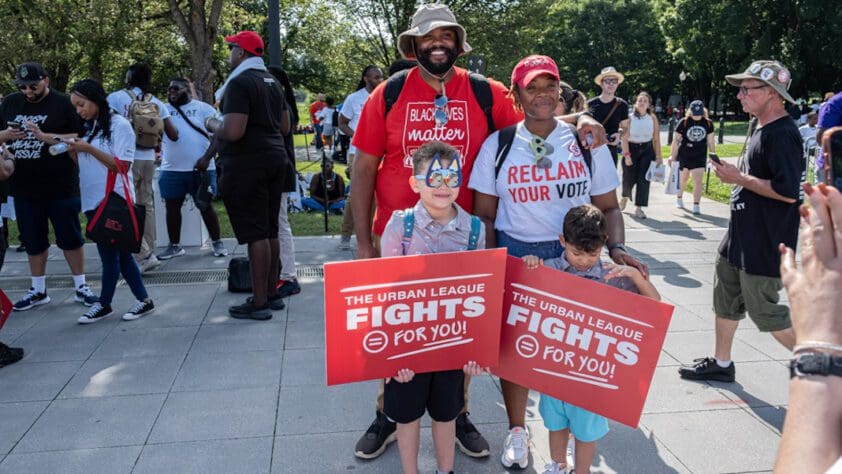
Alexis McGill Johnson, the president of the Planned Parenthood Federation of America and the Planned Parenthood Action Fund, said that she was at the march “simply because the work is not finished. Our fight for freedom continues, and it runs through our democracy. Until the work to really ensure that our representation is clear, our ability to express our right and our voices, we won’t be able to secure all of the other rights that help keep us free, like reproductive freedom, like our ability to educate our children, like our ability to live free from violence.”
Just a few hours after the march began, three Black people were killed by a white man in a shooting at a Dollar General store in Jacksonville, Florida. Donna Deegan, the mayor of Jacksonville, called the shooting a “hate-filled crime.”
Sharpton, King, Waters King, and Jonathan Greenblatt, the CEO of the Anti-Defamation League, said in a statement about the shooting: “Such bigotry should have no place in our society. And it is a reminder that the hate-fueled violence that Dr. King called out sixty years ago and that we condemned today from the steps of the Lincoln Memorial, aren’t antiquated concerns, but remain a clear and present danger that threatens us all.”
Published with permission of The American Independent Foundation.
Recommended

U.S. House Speaker Johnson says IVF should be protected — just not by Congress
U.S. House Speaker Mike Johnson said Thursday that it’s up to states and not Congress to preserve access to in vitro fertilization, weighing in on a growing national debate and campaign issue.
By Jennifer Shutt, States Newsroom - March 14, 2024
Biden calls for expanded child tax credit, taxes on wealthy in $7.2 trillion budget plan
President Joe Biden released his budget request for the upcoming fiscal year Monday, calling on Congress to stick to the spending agreement brokered last year and to revamp tax laws so that the “wealthy pay their fair share.”
By Jennifer Shutt, States Newsroom - March 11, 2024
Telehealth abortions on the rise since Dobbs, new report shows
Researchers studying national abortion trends found that in the 15 months since Roe v. Wade fell, abortion rates remained elevated despite more limited access throughout the U.S., according to the Society of Family Planning’s latest #WeCount report published Wednesday.
By Sofia Resnick, States Newsroom - February 28, 2024







